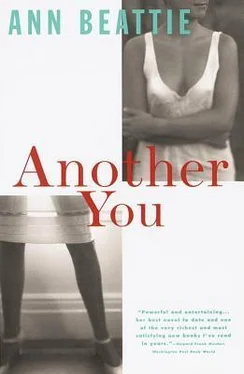Ann Beattie - Another You
Здесь есть возможность читать онлайн «Ann Beattie - Another You» весь текст электронной книги совершенно бесплатно (целиком полную версию без сокращений). В некоторых случаях можно слушать аудио, скачать через торрент в формате fb2 и присутствует краткое содержание. Год выпуска: 2014, Издательство: Vintage Books, Жанр: Современная проза, на английском языке. Описание произведения, (предисловие) а так же отзывы посетителей доступны на портале библиотеки ЛибКат.
- Название:Another You
- Автор:
- Издательство:Vintage Books
- Жанр:
- Год:2014
- ISBN:нет данных
- Рейтинг книги:5 / 5. Голосов: 1
-
Избранное:Добавить в избранное
- Отзывы:
-
Ваша оценка:
- 100
- 1
- 2
- 3
- 4
- 5
Another You: краткое содержание, описание и аннотация
Предлагаем к чтению аннотацию, описание, краткое содержание или предисловие (зависит от того, что написал сам автор книги «Another You»). Если вы не нашли необходимую информацию о книге — напишите в комментариях, мы постараемся отыскать её.
Another You — читать онлайн бесплатно полную книгу (весь текст) целиком
Ниже представлен текст книги, разбитый по страницам. Система сохранения места последней прочитанной страницы, позволяет с удобством читать онлайн бесплатно книгу «Another You», без необходимости каждый раз заново искать на чём Вы остановились. Поставьте закладку, и сможете в любой момент перейти на страницу, на которой закончили чтение.
Интервал:
Закладка:
What a disturbing winter it had been, with hardly anyone doing what was proper. The word came to Sonja’s mind because Tony sometimes used it, as in “a proper tea.” She had once found his Englishness charming and often amusing, his diction as arch as his behavior seemed uninhibited. A proper fuck , she had said to him once, turning down the bed in their motel room and smoothing the sheets, lighting a little devotional candle she’d bought while wandering through the drugstore in search of Evie’s beloved Muguet des Bois dusting powder. Instead of wildly discarded clothes and a football tackle, she had wanted them to sit on opposite sides of the bed and undress, to make love with classical music playing on the radio and the candle glowing. To her horror, Marshall had come upon the candle in her purse several weeks before. She had left it unzipped and, passing by, he had sneezed, then sneezed again, then reached into her bag, which was on the kitchen chair, for a tissue, coming up with a handful of pens and credit card receipts and the candle, yet he’d acted as if scooping a candle out of her purse was entirely unexceptional. He’d stuffed it back along with everything else, without even commenting, dropping the little white candle back in the glass holder, extracting a tissue and sonorously blowing his nose. There it had been, the moment that could have changed everything, and he had simply blown his nose long and hard, his quizzical look a response only to her standing and staring at him, horrified.
Now the priest was standing next to Marshall, mentioning Evie by name: first name, middle name, maiden name, married name — all the endless, confusing identities of women born in Evie’s generation — and then, his words obscured by a howl of wind, clasping Marshall’s hand, the ceremony apparently finished, the Bible clasped in his gloved hand, the ungloved hand he had used to turn the pages extended to everyone who gathered around them. The priest offered further condolences as Marshall returned the priest’s handshake. He thought how different this funeral had been from his father’s, when he and Gordon had stood alone at the grave, listening to a soprano sing a song his father had loved, an a cappella version of Robert Frost’s “The Road Not Taken.” His father’s lawyer had been the only other person present. The lawyer and the singer had come together, in a limousine. Where had the woman been found? She was short and not at all attractive — Gordon had joked that the lawyer had borrowed her from amateur night at some nightclub — wearing blue harlequin glasses and singing with a voice alternately glorious and shrill, her spike heels sinking in the grass during the laboriously prolonged song. It would have pleased Gordon, who loved ironies, to know that their father had mistaken a poem written to mock another poet for a deeply felt expression of conflict, but he hadn’t told Gordon that. It had seemed too disrespectful of his father, who had been moved by something he hadn’t known was ultimately a kind of joke. Evie would have been at the funeral except that she had the flu, and Sonja hadn’t come because she had had a miscarriage the night before. Gordon had said with great relief that his wife was also ill. Marshall doubted it, though no doubt Gordon had also thought he’d been lying when he said Sonja was sick. Why had he hesitated to tell his brother the truth about Sonja’s miscarriage?
A man and a woman about Sonja and Marshall’s age, who had come late, reminded Sonja that they had often visited Evie when they went to the rest home to see the woman’s mother. They were Catholics, Sonja had noticed during the funeral; they had genuflected, and now the woman greeted the priest by name as she reached out to clasp his hand.
Marshall excused himself and walked toward the old man, stopping to say hello and to hug Mrs. Azura, who had been Evie’s neighbor in the townhouse she’d lived in before her stroke. Mrs. Azura was a kind woman who had brought jars of homemade soup to the nursing home, who had always insisted to Evie that she would eventually make a full recovery and return to her home, where they would be neighbors again. Mrs. Azura had been so emphatic with Evie in saying they would be living side by side again that Sonja had never been sure, until Mrs. Azura’s house went on the market while she continued to speak to Evie as if her being away was only a temporary thing, that the woman knew better than what she was saying. Another woman from the townhouse complex was also at the funeral, but Sonja knew her hardly at all, and Mrs. Azura had to whisper her name to Sonja so she could greet her: Andrea FitzRoy, a divorced woman in her late fifties who had taught Evie how to do bargello. She had strawlike dyed hair and clown circles of rosy color on her cheeks. As she offered her sympathy to Sonja, clasping her hand to communicate her sincerity, Marshall reappeared and said that the old man’s attendant had explained that the old man had lost his voice to laryngitis. He had told Marshall that Evie had been a longtime friend he had known many years back, someplace in New England, the attendant thought. The old man’s name was Ethan George Bedell, and he had been a college friend of Marshall’s father. He had known Gordon and Marshall when they were little boys — too little to remember him, he was sure. Marshall did not remember, but he was surprised that Evie had kept contact with someone through the years who was such an old friend, but of whom she had never spoken. Mr. Bedell had asked the male nurse to bring several photographs to give to Marshall. He had brought them but left them in the glove compartment of the van, he’d told Marshall, not sure what would be the proper time to present them. As he delivered this information, he had obviously been torn between staying at the old man’s side and immediately going to get the photographs. Marshall had, of course, asked them to join the others at their house for coffee. He reported this information to Sonja in bits and pieces, interrupting himself to thank people for coming, to make sure they understood the directions to the house. Listening, Sonja remembered the day not long ago when she had sat beside Tony in his car, imagining a fantasy garden, while he had questioned her about directions to the new motel. “Just follow me,” the priest said to Mrs. Azura, who finally had to admit that she had no car, that she had taken a cab to get there. The priest insisted on giving her a ride, as Marshall gently scolded her for not calling them to arrange transportation to the funeral.
“He does not have good health,” the man wheeling Mr. Bedell past them said. “He thanks you, but he is unable to continue on to your house.” Standing behind the wheelchair, the man rolled his eyes upward. What was this? Dismay at not being able to stop for coffee, or a more general roll of the eyes about everything: old age, bad health, death?
“You and Evie were friends for many years,” Sonja said a little louder, crouching to look into the old man’s face. She nodded in agreement with herself, because the old man only stared. “I’m Marshall’s wife. Evie’s stepson’s wife,” Sonja said, gesturing toward Marshall.
“He does not hear well,” the man behind the wheelchair said loud enough to startle Sonja. “He told me when he still had his voice that he knew all about you,” the man said, in a more conversational tone of voice.
All about her. Wouldn’t that have been distressing. Yet of course he did not; he had probably only heard some innocuous story from Evie. “You know about me from talking to Evie,” Sonja said. It was half a statement of fact — of course that would be how he knew — and half an expression of her puzzlement: How was it she had never heard of Ethan Bedell? “You must have read about the funeral in the newspaper,” she said.
Читать дальшеИнтервал:
Закладка:
Похожие книги на «Another You»
Представляем Вашему вниманию похожие книги на «Another You» списком для выбора. Мы отобрали схожую по названию и смыслу литературу в надежде предоставить читателям больше вариантов отыскать новые, интересные, ещё непрочитанные произведения.
Обсуждение, отзывы о книге «Another You» и просто собственные мнения читателей. Оставьте ваши комментарии, напишите, что Вы думаете о произведении, его смысле или главных героях. Укажите что конкретно понравилось, а что нет, и почему Вы так считаете.












